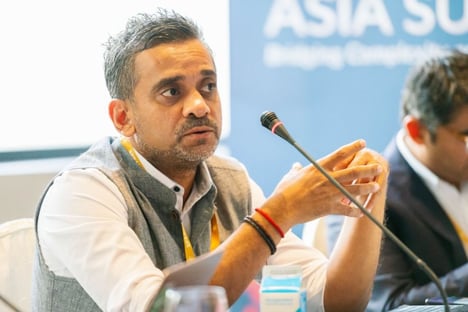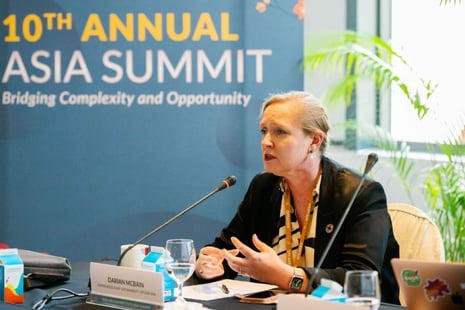Written by Jael Tan, Head of Government & International Relations, Elevandi
Key Insights from the 2023 Milken Institute Asia Summit | Digital Public Infrastructure 2.0: The Blueprint for Building a Digital Economy

Big thanks to the Milken Institute for hosting this pivotal discussion at their 10th annual Asia Summit and for our esteemed speakers for their time and perspectives:
-
Darian McBain, Founder, Outsourced Chief Sustainability Officer (OSCO)
-
Dirk Van Quaquebeke, Managing Partner, BEENEXT Capital Management
-
Milind Sanghavi, Former Director and Regional Head of Payments, APAC, Meta
-
Nicole Valentine, Director, FinTech, Milken Institute
-
Nyi Nyein Aye, CEO, ThitsaWorks
-
Urjit Ravindra Patel, Vice President of Investment Region 1, Asian Infrastructure Investment Bank
Guest contributors:
-
Salim Dhanani, CEO and CO-Founder, Pave Bank
-
Michael Weiss, Hope.money
The session was hosted and moderated by:
-
Pat Patel, Executive Director, Elevandi
-
Jael Tan, Head of Government & International Relations, Elevandi
The rapid growth of digital solutions has helped to enhance the economic and social well-being of millions of people around the world. However, digital inclusion and interoperability across solutions remain as challenges. Over the past decade, the rise of digital public infrastructure in countries such as India and Singapore has created the foundation for their digital economy, enabling interoperable solutions and seamless digital services to reach more people and businesses, at a lower cost and greater convenience and security. The key building blocks include digital identity, authorisation and consent, payments interoperability and data exchange.
On 14 September at the Milken Institute Asia Summit, Elevandi and Milken Institute convened a discussion among global experts to dissect the regulatory, sustainability, technology, and business value aspects of a digital public infrastructure to ask the following questions:
-
What can we learn from the implementations in India and Singapore?
-
What have been some of the challenges in these and other markets that are considering building digital public infrastructure?
-
Given that technology and the applications of technology have evolved a great deal in recent years, what would the next generation of digital public infrastructure look like and what are the key considerations from a technology, regulatory, sustainability, inclusivity and business value perspective?

In 2019, a collaborative effort between The Monetary Authority of Singapore, the Central Banks, and government agencies of Brunei, Cambodia, Ghana, and Kenya, along with Mastercard, yielded a document on Foundational Digital Infrastructures for Inclusive Digital Economies. This report delineated the four vital pillars of a foundational digital infrastructure: Digital Identity, Authorisation and Consent, Payments Interoperability, and Data Exchange. Together, these pillars laid the groundwork for comprehensive digital transactions, fulfilling the foundational needs of a digital economy.
Fast forward four years to a gathering in Kigali, where influential stakeholders from the Global South convened to delve deeper into this topic. Here, the essence of 'ubuntu,' a philosophy rooted in community equality and wealth distribution, was invoked as the cornerstone of digital infrastructure implementation in Africa. Emphasising accessibility to open data and inclusion as paramount, the discussions centred on key lessons gleaned from Rwanda and Kenya. Authorities from these nations underscored the importance of involving citizens in co-curating the digital public infrastructure. This included establishing a social contract between the government and its citizens, raising user awareness about data privacy and protection, and enhancing user literacy about the product, all aimed at ensuring the seamless delivery of services. Regulatory authorities from Rwanda and Zambia highlighted the significance of collaboration and knowledge exchange, drawing from their respective implementation journeys.
As the dialogue drew to a close, a pressing question lingered in the minds of the participants: How can we construct a compelling value proposition that ignites a strong appetite for inclusion within the digital ecosystem?

Understanding the current state of digital public infrastructure development in Asia
The India Stack serves as an indispensable case study, offering valuable insights into the implementation of digital public infrastructure and the broader digitalisation trends in Asia. The monumental scale of the Aadhaar rollout symbolises a potential turning point in a nation's fintech strategy and its overall digital economy growth. Such a significant implementation necessitates a national agenda as the primary driver, supported by a clearly defined central objective and a flexible framework. However, it's worth noting that a nationally-driven approach has its complexities. On one hand, it can lead to the creation of indirect income streams, as exemplified in India and Indonesia, making the model commercially self-sustaining. On the other hand, geopolitical factors may pose barriers when pursuing cross-border projects built upon this infrastructure.
In a period when India was already making remarkable advancements in digital infrastructure, Singapore embarked on its own transformative journey. Despite a well-established traditional banking sector and a prevalent cash-based economy, Singapore recognised the imperative for modernisation. The linchpin of Singapore's success was the seamless integration of payment systems and identity verification, a strategic move that paved the way for widespread adoption across the ecosystem. Once financial inclusion was achieved through the integration of citizens' bank accounts, the next pivotal milestone was the establishment of a real-time payments network tailored for merchants and businesses. This innovative solution enabled effortless transactions with fellow vendors, signifying a crucial step toward cultivating a self-sovereign identity system. Under this system, validation and credentials from the sovereign pillars gained universal recognition, granting users the added benefits of heightened security through shared resources.
Outlining the key challenges
When outlining the key challenges, the consensus among the participants was clear: one-size-fits-all solutions are inadequate, and various factors must be considered.
High Costs and Incentives:
Around the room, it was universally acknowledged that high costs and the absence of monetary incentives pose significant obstacles for businesses. While incentives, or "carrots," exist, it's crucial for individuals to discover and leverage these incentives without heavy reliance on subsidies. Notably, the success of the UPI (Unified Payments Interface) was achieved through equity investment rather than extensive subsidies. Additionally, recognising that some revenue streams cannot be entirely internalised, the emphasis was placed on the indirect financial benefits, with a  recognition that Central Bank Digital Currencies (CBDCs) could be a transformative force.
recognition that Central Bank Digital Currencies (CBDCs) could be a transformative force.
Vision and Innovation: Discussants highlighted the need to incorporate the unbanked population into the framework for a comprehensive final draft. The absence of uniform standards for constructing the four essential blocks was a major challenge. Data exchange between systems and the sharing of data between public and private entities underscored the necessity for globally accepted open standards.
Trust in Systems - Environmental and Social:
The challenge of trust within the systems encompassed both environmental and social dimensions. Addressing cross-border payments, extending banking services to the unbanked, and driving trade flows were identified as crucial. Ensuring the accuracy and verification of emission reports was also a pressing concern.
Sustainability for Longevity:
Participants stressed the importance of sustainability from an economic perspective to maintain continuous funding. Balancing profitability without rushing towards a zero-margin or profit pool was a key consideration. It was proposed that profit pools should be reinvested into infrastructure development to sustain the ecosystem.
Execution Challenges:
Returning to the UPI model, a cost-in methodology was suggested. The need for public and private sectors to collaborate was highlighted, although execution remained uncertain.
Understanding and Governing Data Privacy and Ethics:
The final challenge centred on comprehending and governing data privacy and information. Responsible and ethical data usage was underscored, particularly given that those benefiting from the system might not be the data generators.
The multifaceted challenges facing the digital infrastructure ecosystem encompass cost, incentives, standards, trust, sustainability, value capture, execution, and data governance. Addressing these challenges requires a comprehensive, collaborative approach that balances economic sustainability, innovation, and ethical data usage.
What could the next phase of digital public infrastructure look like?
The next phase of digital public infrastructure holds the potential for transformative advancements in technology, sustainability, inclusivity, and other vital pillars.
 Inclusivity, Empowerment and Trust:
Inclusivity, Empowerment and Trust:
The first principle of the next-generation digital public infrastructure should be inclusivity. No one should be left behind, and the focus should be on empowering individuals and communities. This could involve co-ownership, value capture, monetisation, and profit-sharing mechanisms, ultimately providing tangible benefits and services to end-users and the public. This approach not only serves the prospect of scaling but also fosters a sense of ownership and participation among the population.
Trust is a fundamental building block of any digital infrastructure. It is imperative to take everyone on the journey, gradually building trust in the system. What were once perceived as "sticks" should transform into "carrots." Public-private partnerships will be key to success, ensuring that the infrastructure generates enough revenue to maintain its quality and accessibility.
Beyond traditional financial considerations, the next phase of infrastructure should address broader humanity-level topics, such as climate change. By intertwining climate change goals with everyday financial consumption, this infrastructure can drive incentives, monetisation, and positive change on a global scale.
Innovation and Collaboration:
The integration of new infrastructure and technology will be pivotal in shaping the next phase. Collaboration between private banking sectors, FinTech companies, tech startups, and governments can lead to the design of cutting-edge infrastructure. It doesn't have to be a competitive endeavour; a coordinated, multi-stakeholder approach can drive innovation and inclusivity. The power of community involvement by engaging people who care, even if they are not directly involved, is crucial. Building a sense of collective responsibility and participation is essential for the success of the infrastructure. Those who may not directly benefit but still contribute because they find it worthwhile play a significant role in this context.
Resource Investment:
Building this advanced infrastructure requires significant resources, including financial investment, skilled manpower, and time. A dependence solely on government providers is not sustainable in the long term. Diversifying the sources of these resources, both public and private, is vital for the infrastructure's resilience and continuity.
.jpg?width=671&height=458&name=MilkenInstitute_AsiaSummit_Sept2023__%20(1).jpg)
Adding New Dimensions:
A challenger view to digital infrastructure implementation is to explore another dimension of frameworks outside of the existing foundational pillars that already exist. The emergence of Web3 introduces an additional layer of protocol that carries both opportunities and regulatory challenges. It involves dismantling the network effects entrenched in traditional models, thereby sparking a complex interplay between socialist and capitalist dynamics. The quest here is to discover a pathway that aligns incentives effectively. A focal point lies in recognising the inherent value of the data individuals leave behind. In this context, the mantra is clear: the smaller the technological unit, the better. Empowering individuals with greater control over their data units becomes paramount, and this emphasis extends to fortifying the weakest links in the system, as exemplified by the India Stack framework.
Central to this dimension is also the fundamental question: where does value capture occur within the ecosystem? It entails discerning how data, protocols, and applications converge to create value, thereby offering insights into the intricacies of a multifaceted framework.
As the dialogue concluded, the political imperative was impressed upon the group as a key driving force in achieving democratic and inclusive digitisation. With the right powers, motivation and incentives combined, we have the opportunity to create a system that not only serves economic interests but also addresses societal and global challenges while ensuring sustainability and accessibility for all.
The next chapter
This roundtable was just the beginning of a larger conversation. Join us we dive deeper into what digital public infrastructure could look like in a world today, with web3 and decentralisation at its core, and an infrastructure design driven by emerging technologies such as artificial intelligence coming to the fore.
Next-generation digital public infrastructure
14th November, (Invite-only) Elevandi Insights, Marina Bay Sands Convention Centre
Register your interest to attend the Elevandi Insights.


COMMENTS